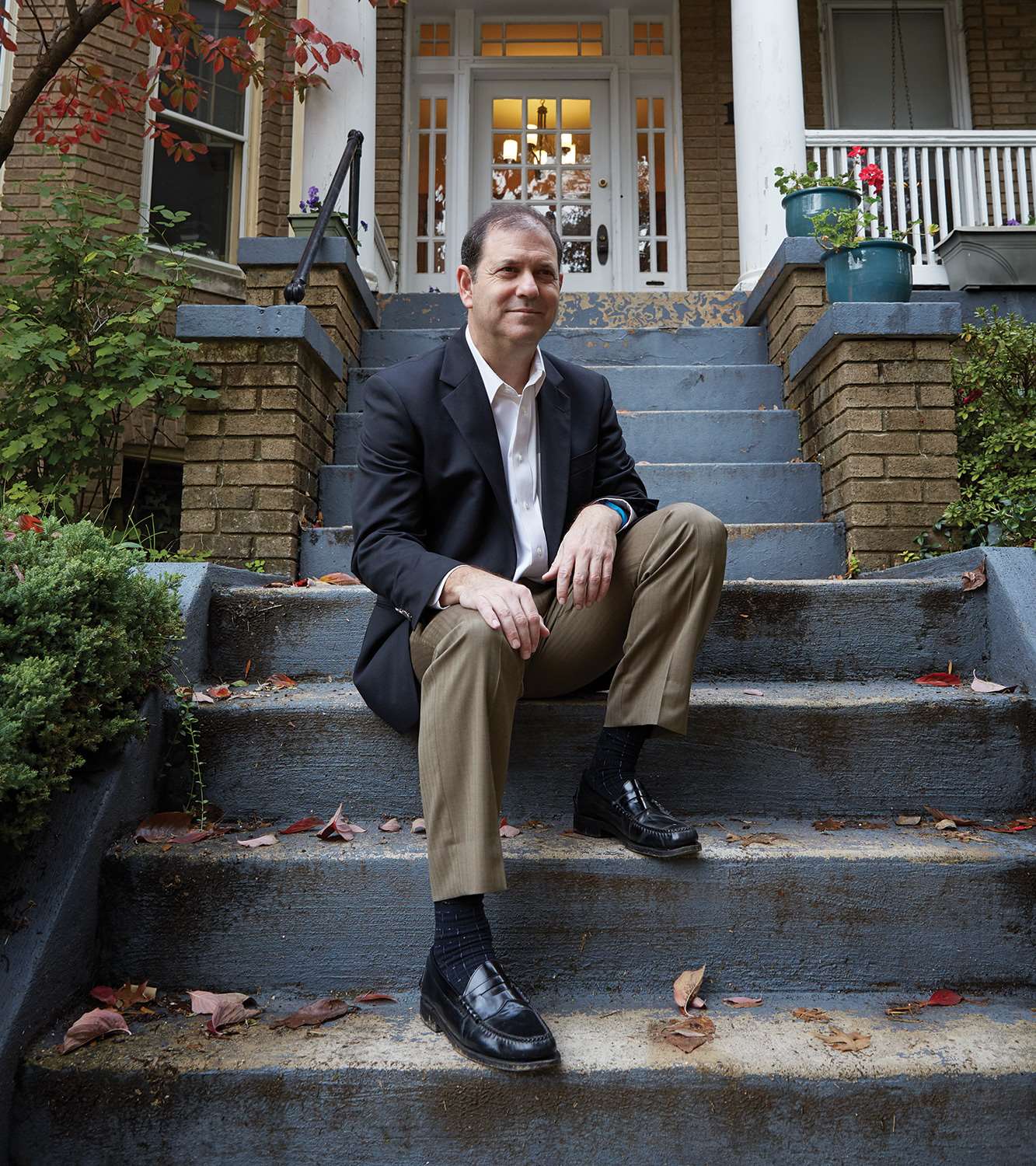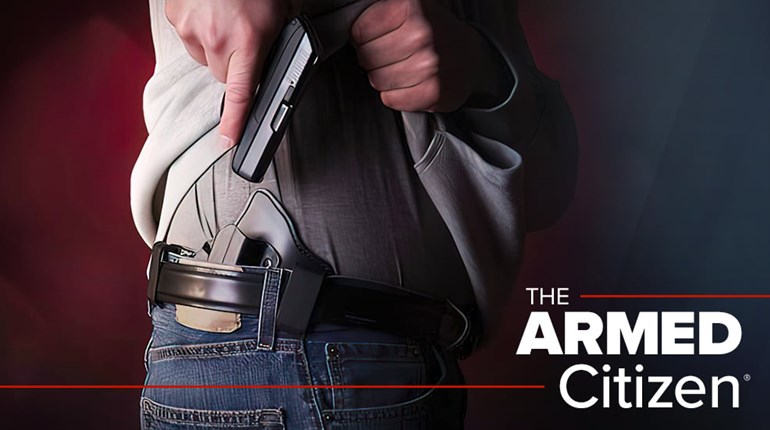
A former CEO of National Public Radio spent a year visiting America’s heartland and came away with a different perspective on gun rights.
This feature appears in the January ‘18 issue of NRA America’s 1st Freedom, one of the official journals of the National Rifle Association.
It can be illuminating to wander around other people’s countries. You might notice the side of the street they drive on, the different sound of their police sirens, the color of their mailboxes, the aromas of foods you may not be familiar with. You also might, by comparison, notice things about your own point of view and culture. And then, if you stay long enough to get to know even one of the people living there, some of your preconceived notions might change.

Enter former National Public Radio CEO Ken Stern, author of the book, Republican Like Me: How I Left the Liberal Bubble and Learned to Love the Right.
More than a year ago I received an email from Stern saying he wanted to talk to me about the gun culture. Google had led him to an article I’d written for America’s 1st Freedom titled “Stop The Inescapable Epidemic Of Lies.” The article began with an anecdote about how my new neighbors, who had just moved to the country from New York City, called the police when they heard gunshots. They’d heard another neighbor, Hal, shooting on his own little sporting clays course from a half-mile away on the other side of a woodlot, as he often does. The cop who showed up simply told them: “Welcome to the country.”
Stern thought that was great, and he wanted to chat about it. He was beginning research for his aforementioned book.
I replied to him, and we talked for more than an hour about guns and the people who own them. He was very inquisitive, but also quite naive. He’d never shot a gun in his life and basically agreed with every proposed regulation and gun ban Michael Bloomberg has ever dreamed up for the rest of us. I hung up the phone hoping he’d be an exception from the media members I’ve met.
Before going further, let’s take a look at Stern.
He is an attorney and was deputy general counsel for the 1996 Bill Clinton presidential campaign. He joined NPR in 1999 and became its CEO in 2007. “He is a numbers cruncher and lawyer who helped stabilize NPR after years of rocky finances,” NPR reported, just after he was tossed out after a year and a half as CEO. During his tenure, the audience for NPR programs doubled. Stern, you see, embraced modern ways of getting the news out. NPR soon became a leader in podcasts and struck deals to deliver its content through smart phones.
“What I basically found is gun control doesn’t do what its backers claim it does.”Stern didn’t do anything to try to balance the often left-leaning politics of NPR during his tenure, even though NPR is funded by taxpayers, not by any political party. Nevertheless, by embracing change in how people get their news, he ticked off the old guard. Local radio stations got nervous. If people could get NPR on their cell phones, would that mean they wouldn’t tune into their local radio stations? So NPR’s board tried to hold back time by ousting Stern.
A Liberal From D.C. Goes To The Heartland
Now, back to that trip to another country to study foreigners and their beliefs.
In this case, we were that foreign people Stern went to meet. Sure, he is not technically from another country. Stern lives in an urban and well-to-do suburb of Washington, D.C., a place where he says 93 percent of residents vote only for liberal Democrats. It’s a place where, according to Stern, none of his neighbors own guns, but where they are sure that gun control is the answer.
Stern watched the increasing polarization of our country with growing concern. As a longtime partisan Democrat himself, he felt forced to acknowledge that his own views were too parochial, too absent of any exposure to the “other side.” Consequently, Stern decided to leave his quiet, wealthy and comfortable community to meet “red America” and find out what people unlike him really believed.
After a year of venturing out into what some refer to as “flyover country” or America’s heartland, he had a lot to say about gun owners and others who understand why the right to bear arms is a cornerstone of freedom.
After his journey around America, Stern said, “I regret that I waited until well after I left NPR to meet the rest of America. But when you are liberal, and everyone else around you is as well, it is easy to fall into groupthink on what stories are important, what sources are legitimate and what the narrative of the day will be.”
Stern had run smack into what a long line of foreign writers, from Alexis de Tocqueville to James Bryce, did when they traveled to meet people who live away from America’s metropolitan areas along the East Coast. Stern said, “I found an America far different from the one depicted in the press and imagined by presidents (‘cling to guns or religion’) and presidential candidates (‘basket of deplorables’) alike.”
For advice on how to get started in his journey, Stern had turned to Fox News host Tucker Carlson. “When I asked him,” Stern said, “he immediately boomed, ‘Go shoot pigs in Texas. It will be fantastic!’”
Stern said: “I do recognize the rich irony in getting middle America cultural advice from … Carlson, a scion of big media, a fancier of bow ties, and the son of Dick Carlson, a political operator so capable that he landed the job of ambassador to the Seychelles, the only lawful way to get a paid tropical vacation from the U.S. government. But sometimes you can find wisdom from the unlikeliest of sources, and Tucker’s counsel sounded inspired to me.”
So Stern went to Texas to hunt pigs. He didn’t have a gun and he’d only had one quick lesson with a shotgun on a skeet range. That’d be no problem, as the owner of Independence Ranch in Texas was happy to rent Stern a gun for his hunt.
Stern remembered the rented gun as a shotgun, when it was actually a rifle. He was, in fact, more interested in the people. To his surprise, he says, “None of my new hunting partners fit the lazy caricature of the angry NRA member. Rather, they saw guns as both a shared sport and as a necessary means to protect their families during uncertain times. In truth, the only one who was even modestly angry was me, and that only had to do with my terrible ineptness as a hunter.”
Although Stern rented a rifle and told the owner before he arrived he’d need some help learning to use it, his first mentor was an 8-year-old fellow hunter named Isaac.
“In truth, it is Isaac who quickly establishes leadership in our two-man band,” Stern writes in his book. “When I keep forgetting basic rules of gun safety, like swinging the gun in his direction every time I turn to talk to him, it is little Isaac who gently reminds me to keep the gun pointed toward the ground at all times.”
Stern should have taken my earlier advice about attending some gun safety courses with NRA-certified instructors before he went.
The hunt was a series of misadventures for Stern, as other hunters bagged their pigs. Finally, they were all rooting for him, so when a group of pigs came their way, the other hunters held their fire and urged Stern to shoot. He shot and missed and missed, but then he hit one. It ran off squealing, and they soon found it dead.
“In the end, I did bag a pig,” Stern said, “or at least my new friends were willing to award me a kill, so that we could all glory together in the fraternity of the hunt.”
How About His View Of Gun Control?
Before his journey to hunt in Texas and to attend gun shows and more, Stern was for every flavor of gun control. He still is. The difference is that before his journey to America’s heartland, he thought gun control was an elixir for violent crime and murder. Now he admits, “It’s a lot more complicated than that.”
He noted that, because of media bias with regards to the gun issue, the “American public is blithely unaware” of the historic drop in the homicide rate as gun ownership rates have skyrocketed.“Take guns,” he said. “Gun control is one of our most divisive issues, and there are legitimate points on both sides. But media is obsessed with the gun control side and gives only scant, mostly negative, recognition to the gun rights sides.”
In one chapter in his book, Stern discusses some of the more contentious disagreements about gun control.
“Take, for instance, the issue of legitimate defensive gun use (DGU),” he wrote, “which is often dismissed by the media as myth. But DGU happen all the time—200 times a day, according to the Department of Justice, or 5,000 times a day, according to an overly exuberant Florida State University study. But whichever study you choose to believe, DGU happen frequently and give credence to my hunting friends who see their guns as the last line of defense for themselves and their families.”
Here’s one of Stern’s examples:
is smoking. ...
Given how many in the media treat this issue, that’s a big breath of fresh air.
Stern does get some glaring things wrong, though. For example, he quotes figures from England that even Scotland Yard doesn’t stand behind. Yet he still troops through issue by issue related to guns in America, sometimes with guidance from researcher John Lott and others, as he earnestly tries to understand the gun rights side.
“What I basically found is gun control doesn’t do what its backers claim it does,” he said. “I started off this process thinking, as do many of my political coreligionists, that reducing gun violence is simply a matter of will, and of overcoming the Neanderthals at the National Rifle Association (NRA). But I have learned that it is not, and that if we really want to reduce gun violence, we should be focusing not just upon the weapons but on a lot of things around it: poverty, drugs, race, addressing mental illness, opportunity and gangs, to name just a few.”
After his travels, Stern didn’t become a pro-gun enthusiast. He did briefly, he said, change his official party affiliation to “Republican,” but he soon switched it to “Independent.”
Here’s how he describes his metamorphosis.
“We plainly have a major gun violence problem in this country, but liberals seem fairly obsessed with condemning lawful gun owners, and can’t seem to acknowledge that the evidentiary base for most of their remedies can only be generously described as limited,” Stern said. “Go ahead, re-enact the ‘assault weapons’ ban, implement enhanced registration requirements over private sales of guns, and outlaw large-size magazines. Frankly, like most Americans I’m all for it, but I am not deluding myself anymore that these changes will have any meaningful impact on the homicide or suicide rates in this country. Ultimately, these debates are a diversion from more important opportunities to think about how to reduce violence in this country.”
How Has His Honesty Been Received?
Since beginning his journey of discovery, Stern has had some acclaim from the right side of the political spectrum, but not so much from the left.
“Over the past year, I have—from time to time—posted the most mild-mannered of comments on Facebook, suggesting that the gun issue is more complex than one might think,” he said. “My liberal friends have rather disdainfully rejected the facts offered, not usually with their own facts but with the statement that we just need to get on with doing ‘something.’ This would seem to suggest that people who don’t agree with policy for window dressing’s sake are somehow hunky-dory with thousands of gun deaths every year. It is a little window into the sanctimony of some liberals, and I don’t like it very much.”
As for the media and our future, Stern said: “Some may take pleasure in the discomfort of the media, but it is not a good situation for the country to have the media in disrepute and under constant attack. Virtually every significant leader of this nation, from [Thomas] Jefferson on down, has recognized the critical role of an independent press to the orderly functioning of democracy. We should all be worried that more than 65 percent of voters think there is a lot of fake news in the mainstream media and that our major media institutions are seen as creating, not combating, our growing partisan divide.”
He noted that, because of media bias with regards to the gun issue, the “American public is blithely unaware” of the historic drop in the homicide rate as gun ownership rates have skyrocketed.
This honesty has not won him praise from the so-called “mainstream” media. It has not even earned him much criticism, as network news, left-leaning cable news outlets and the big urban papers don’t do a lot of that these days. Now they simply try to ignore away whatever doesn’t fit their preferred narrative, even if their narrative is harming people.
In the end, Stern came to the deep realization that gun control doesn’t achieve what its supporters claim. Yet nevertheless, he still supports these freedom-restricting measures.
Maybe his realization that legal gun owners aren’t hurting anybody and are just exercising a constitutionally protected right will someday be the next step in Stern’s edification. All it takes to get there is honesty—and he has plenty of that.
Frank Miniter is the author of Kill Big Brother, his latest novel, that shows how to keep government from infringing on our liberties. He is a contributor to Forbes and writes for many publications. His website is FrankMiniter.com.
































